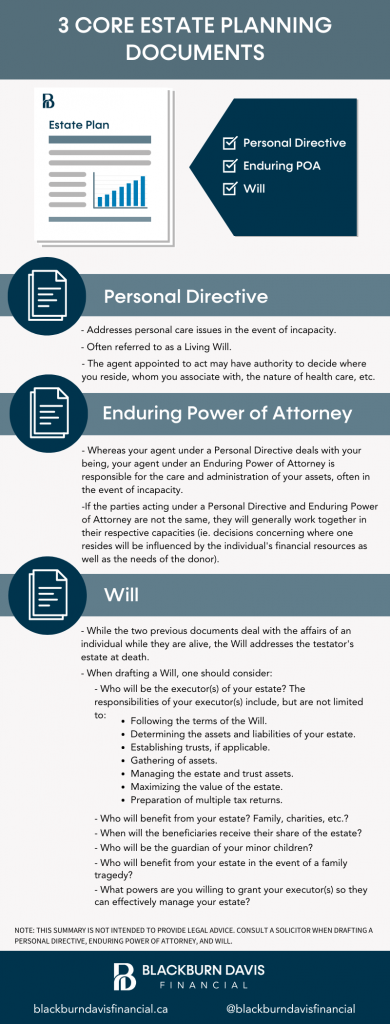Estate planning ensures that if you are physically or mentally incapacitated, your affairs will be managed in a manner that you have prescribed and upon your death, your estate will be distributed according to your instructions.
Here is a brief overview of the three core estate planning documents you may need.

PERSONAL DIRECTIVE
This document addresses personal care issues in the event of incapacity.
It is often referred to as a Living Will.
The agent appointed to act may have the authority to decide where you reside, whom you associate with, the nature of health care, etc.
ENDURING POWER OF ATTORNEY
Whereas your agent under a Personal Directive deals with your being, your agent under an Enduring Power of Attorney is responsible for the care and administration of your assets, often in the event of incapacity.
If the parties acting under a Personal Directive and Enduring Power of Attorney are not the same, they will generally work together in their respective capacities (i.e. decisions concerning where one resides will be influenced by the individual’s financial resources as well as the needs of the donor).
WILL
While the two previous documents deal with the affairs on an individual while they are alive, the Will addresses the testator’s estate at death.
When drafting a Will, one should consider;
- Who will be the executor(s) of your estate? The responsibilities of your executor(s) include, but are not limited to:
-
- Following the terms of the Will.
- Determining the assets and liabilities of your estate.
- Establishing trusts, if applicable.
- Gathering of assets.
- Managing the estate and trust assets.
- Maximizing the value of the estate.
- Preparation of multiple tax returns.
- Who will benefit from your estate? Family, charities, etc.?
- When will the beneficiaries receive their share of the estate?
- Who will be the guardian of your minor children?
- Who will benefit from your estate in the event of a family tragedy?
- What powers are you willing to grant your executor(s) so they can effectively manage your estate?
Please reach out to us if you have questions about the estate planning process. We are here to help identify your estate planning needs, and to develop a strategy and plan to meet those needs. We will also coordinate with your lawyer and accountant to ensure your plan is implemented.
NOTE: THIS SUMMARY IS NOT INTENDED TO PROVIDE LEGAL ADVICE. CONSULT A SOLICITOR WHEN DRAFTING A PERSONAL DIRECTIVE, ENDURING POWER OF ATTORNEY, AND WILL.
